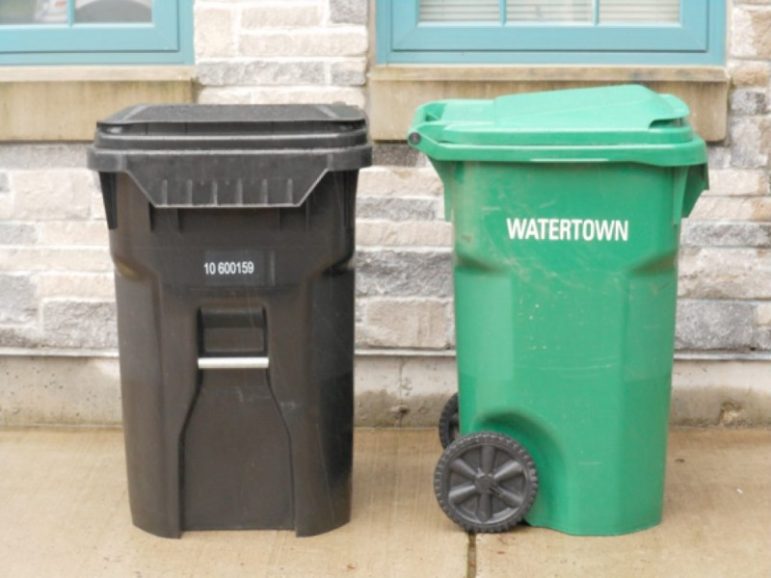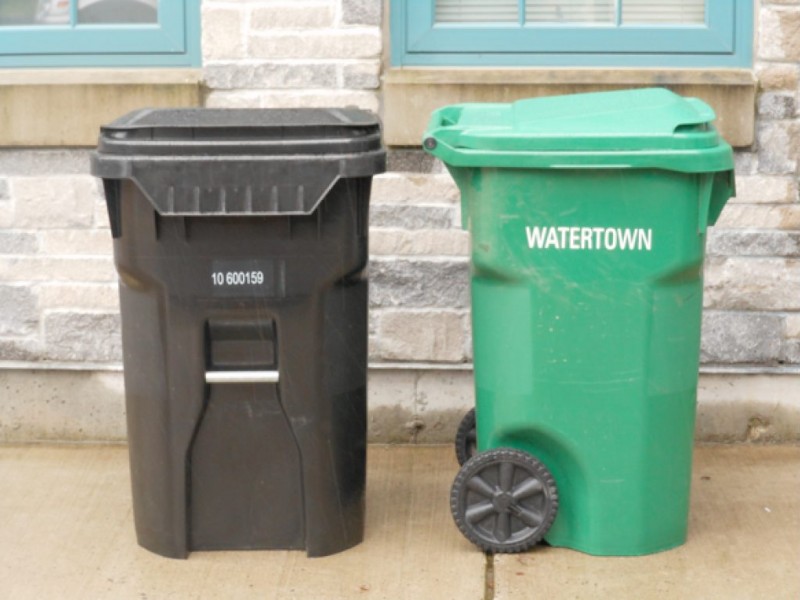
With the recycling world in flux, the Department of Public Works is trying to get Watertown to clean up its recycling in an effort to maintain service and keep prices down.
Jesse Myott, the DPW’s director of Administration and Finance, said that the facilities that take the recyclable items from the United States have become more strict about what they will take. Loads with the wrong type of materials, or those that are dirty or soiled with trash are being rejected.
“Back in 2018 we saw significant change with regards to the global processing of recycling,” Myott said.
Upwards of 40 percent of the recycling going to China got tainted or dirty, Myott said.
“(Recyclers in China) said you guys need to clean up your act, either stop it or we will raise ur prices,” Myott said.
If Watertown does not clean up its recycling, the price may be paid when the Town goes for its next trash and recycling contract. The Town’s contract runs for another two years, or so, Myott said.
“Until the contract is negotiated, we won’t know exactly,” Myott said. “It could result in either raising cost or decreasing service or a combination of the two.”
When choosing a method of recycling, Watertown chose a single-stream recycling program, where all recyclables are put in the same bin.
“Single stream is convenient from the consumer side,” Myotte said. “But now with pushback from the recycling facilities we need to be more careful about items in the recycling and makings sure they are able to be recycled and are appropriate.”
Sometimes the distinction of items that can and cannot be recycled can be confusing.
“Why can’t you recycle a Dunkin’ Donuts cup. It seeks like it you should be able to recycle cups,” Myott said.
The paper cups from Dunkin’, and many other retailers, cannot be recycled because they have a waxy layer which is made of plastic. This prevents the paper in the cup from being broken down into pulp.
Some items that cannot be recycled paper towels, napkins, and styrofoam. It is not clear if other items, such as aluminum foil, are acceptable.
Often, the reason why an item should not be in the recycling is a lot more obvious, Myott said.
“Sometimes they are things that can be recycled but they are dirty,” Myott said. “Like a half a jar of spaghetti sauce. It can contaminate the other items around it.”
Another part of the effort to clean Watertown’s recycling is refusing to pick up recycling. Residents may find a tag on their bin explaining the reason why it was not collected.
One of the more common reasons is people putting trash into the recycling bin.
“If you put trash in it, it will not only can contaminate that bin, but also the whole (truck) load,” Myott said.
Myotte encouraged people to find out more about recycling. The town’s trash and recycling contractor, Republic Services, put out a document showing some common items that can and cannot be recycled (click here to view it).
He added that sometimes items that had not previously been recyclable change status and will be picked up.
“Become an educated (recycler),” Myott said. “The state has some good resources online.”
Find out more at these websites:
Watertown Department of Public Works

Decreasing service is NOT an option here. If anything, they should be *increasing* service. Once every two weeks is not enough.
Helpful article, as far as it goes, but Watertown’s recycling rules are still a bit confusing. Here are some questions I’m still unclear on the answers to.
1) Under “cardboard recycling” the Guide lists “milk cartons”, but later on it says “waxed cartons” are not recyclable. Aren’t all milk cartons made of waxed cardboard?
2) The Guide also says “frozen food boxes” are recyclable. Aren’t many of those made of waxed cardboard, and therefore not recyclable?
3) Cardboard shipping boxes are recyclable. But many shipping boxes have glued plastic tape on them. Are boxes with plastic tape on them recyclable?
4) Some milk cartons have a plastic spigot. Are multi-material cartons like this recyclable?
5) Some glass bottles have a metal or plastic ring or a sheath of plastic around the neck. Are those bottles recyclable, or should we take the neck stuff off?
6) Some metal cans, like olive oil cans or spice cans, have built-in plastic parts. Are multi-material cans recyclable?
7) Are caps (plastic or metal) ever recyclable?
8) Are the round plastic lids of metal coffee cans recyclable?
9) Are juice boxes recyclable? I’ve been told they are, but they are made of multiple materials and are waxed cardboard.
10) The Guide says greasy pizza boxes are not recyclable. To what extent should citizens be cleaning recyclables before they go in the bin?
Great questions, Libby – it’s all a bit mysterious and I suspect I’ve been boosting the rules on occasion. Despite my best intentions.
The document linked here says aluminum foil cannot be recycled, but the document (also from Republic) linked on the DPW site says it can. This — and all the ambiguities above — contributes greatly to any infractions the town might find.
Contradictory info about aluminum foil. The link to Republic Services in the article (“click here to view it” above) says NO aluminum foil. But on DPW’s website, the link to Accepted Materials (also a Republic pdf) say Yes to aluminum foil.
That is confusing. Things that can be recycled change.
Understood. But if the list in the link you provide in your article is the most current one (ie, no aluminum foil) then DPW should update what’s on their website so there isn’t confusion. And as some others have observed, both lists leave a lot of ambiguity.
It would be helpful to have DPW reply to these questions and for there to be another article with the answers
Yes!
Our neighborhood’s recycling barrels are OVERFLOWING every other week. In turn, we have trash in the streets and on properties due to the emptying of these barrels. Residents have been begging for weekly recycling. Please respond. Thank you.
This has come up repeatedly and the response from the town is weekly pickup increases costs by at least $500k. Their decision was instead to subsidize purchasing additional recycling toters ($85 each purchasable from the DPW.) We got ours at the very start of this contract – so it worked out to be an additional $17/year. But if you buy it now it’s an additional $42.50/year since we have less than two years left. Who knows if we will still be doing single stream with the next vendor!
We are all trying to do our part here. China’s National Sword is trying to protect its people. There’s no easy and convenient solution. 🙁